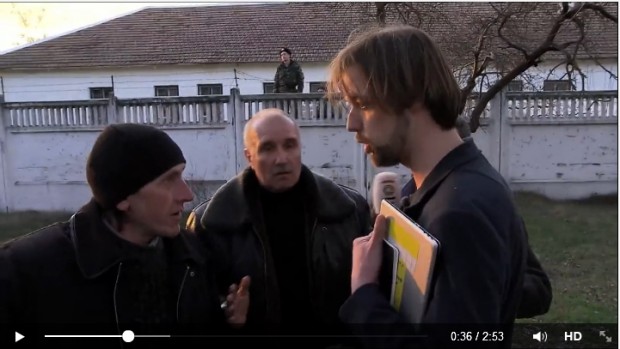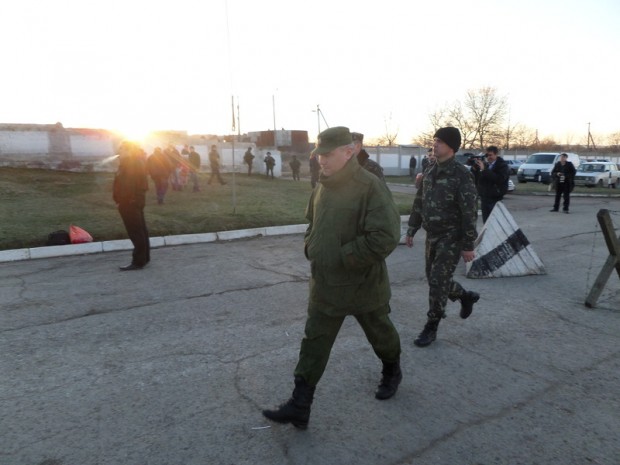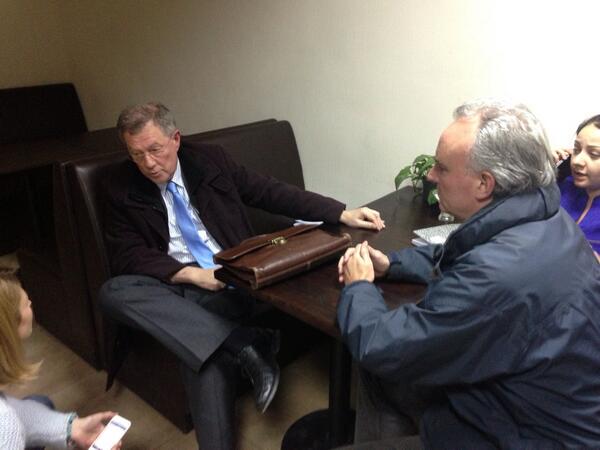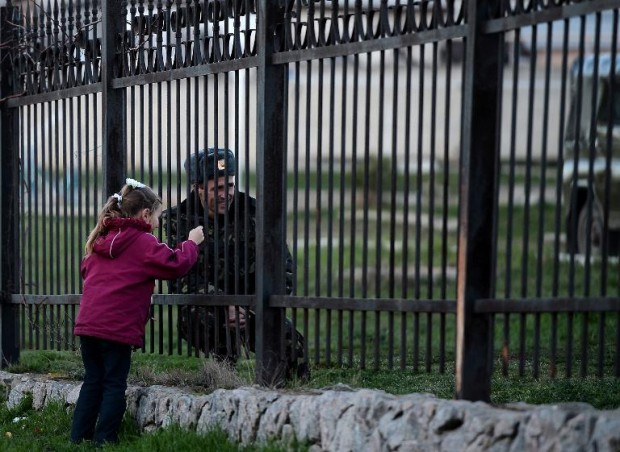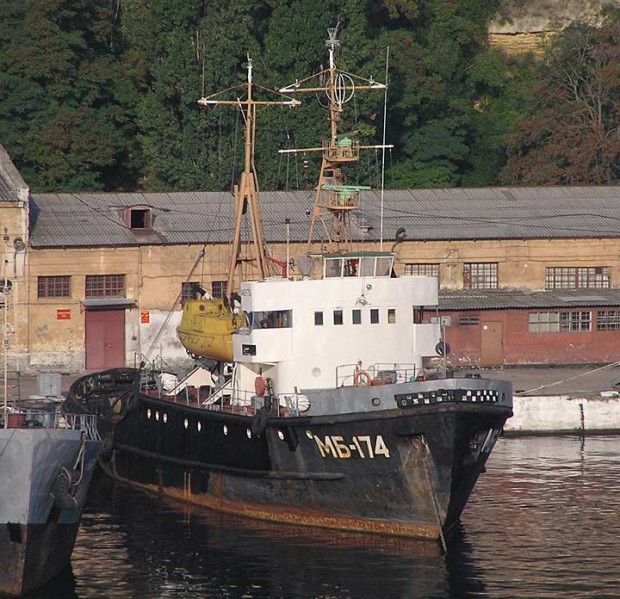The war of words between Russia and the EU and USA is intensifying. While the Russian Foreign Minister, Sergei Lavrov, is attending meetings in Paris to persuade France, an arms supplier to Russia, to oppose sanctions, Russian state media have released potentially damaging phone recordings between EU diplomats.
Yesterday’s liveblog can be found here. For an overview and analysis of this developing story see see our latest podcast.
Below, we will be making regular updates throughout the day:
Liz Wahl, anchor of the Kremlin’s propaganda arm RT.com dramatically resigned on air today from her position. She mentioned the statement yesterday by Abby Martin, another RT host, that “Russian intervention in Crimea is wrong.” Wahl said her grandparents came as refugees to the US after the 1956 Hungary Revolution; she is the daughter of a veteran; and her partner is a physician in a US military hospital “where he sees everyday the ultimate prices that people pay for this country.”
“That is why I personally cannot be part of a network funded by the Russian government that whitewashes the actions of Putin. I’m proud to be an American and believe in disseminating the truth. And that is why, after this newscast, I’m resigning.”
But only last week on 28 February, Wahl unabashedly hosted a show on the “costs” indicated by President Barack Obama for Russia’s military action in Ukraine, featuring Brian Becker, national coordinator of International ANSWER, a coalition of leftist, anti-imperialist and anti-Zionist organizations that have taken a pro-Saddam position. Becker spoke of Obama’s “vivid demonstration of unrestrained arrogance” regarding “hypocritical” US statements about Putin’s “interference in internal affairs” when the US has ostensibly “interfered over and over again in the internal affairs of Ukraine, promoting a coup d’etat” that put in power a “semi-fascist government…installed…by a rump session of parliament.”
“Crimea is the part of the country that certain culturally, historically and politically identified with Russia,” said Wahl during that show, and urged Becker to frame events in Crimea in the context of “past interventions such as Kosovo, Serbia.”
2231 GMT: The reset is over. The US State Department has published “President Putin’s Fiction: 10 False Claims about Ukraine”.
Some excerpts, which echo what The Interpreter has been reporting for the last 16 days:
1. Mr. Putin says: Russian forces in Crimea are only acting to protect Russian military assets. It is “citizens’ defense groups,” not Russian forces, who have seized infrastructure and military facilities in Crimea.
The Facts: Strong evidence suggests that members of Russian security services are at the heart of the highly organized anti-Ukraine forces in Crimea. While these units wear uniforms without insignia, they drive vehicles with Russian military license plates and freely identify themselves as Russian security forces when asked by the international media and the Ukrainian military. Moreover, these individuals are armed with weapons not generally available to civilians.
***
3. Mr. Putin says: The opposition failed to implement the February 21 agreement with former Ukrainian President Viktor Yanukovych.The Facts: The February 21 agreement laid out a plan in which the Rada, or Parliament, would pass a bill to return Ukraine to its 2004 Constitution, thus returning the country to a constitutional system centered around its parliament. Under the terms of the agreement, Yanukovych was to sign the enacting legislation within 24 hours and bring the crisis to a peaceful conclusion. Yanukovych refused to keep his end of the bargain. Instead, he packed up his home and fled, leaving behind evidence of wide-scale corruption.
***
6. Mr. Putin says: Ethnic Russians are under threat.The Facts: Outside of Russian press and Russian state television, there are no credible reports of any ethnic Russians being under threat. The new Ukrainian government placed a priority on peace and reconciliation from the outset. President Oleksandr Turchynov refused to sign legislation limiting the use of the Russian language at regional level. Ethnic Russians and Russian speakers have filed petitions attesting that their communities have not experienced threats. Furthermore, since the new government was established, calm has returned to Kyiv. There has been no surge in crime, no looting, and no retribution against political opponents.
***
8. Mr. Putin says: There have been mass attacks on churches and synagogues in southern and eastern Ukraine.The Facts: Religious leaders in the country and international religious freedom advocates active in Ukraine have said there have been no incidents of attacks on churches. All of Ukraine’s church leaders, including representatives of the Ukrainian Orthodox Church-Moscow Patriarchate, have expressed support for the new political leadership, calling for national unity and a period of healing. Jewish groups in southern and eastern Ukraine report that they have not seen an increase in anti-Semitic incidents.
Read the full list here.
2151 GMT: Olaf Koens, a Dutch journalist who has been covering the Russian invasion of Ukraine, managed to have his cameraman film an encounter with some Russian “self-defense” volunteers blocking him from interviewing a soldier on an army base in the Crimea. Afterward he uploaded a video to his Facebook page. Here’s our translation of an an excerpt of the dialogue starting at 1:15, after Koens attempts to interview the soldier, is pushed away, and is told not to “start a provocation.”
Man: You are violating public order.
Koens: What public order?! What, I can’t be here? I’m not creating any provocation. What’s all this?
Man: I beg you, please.
Koens: What’s all this? Why aren’t you letting me through here. I want to talk to him.
Man: I’m telling you once again…
Koens: This is my job, to talk to him.
Man: And my job is different, so there won’t be any provocations.
Koens: Please show me some ID that confirms that you can do that.
Man: Are you accredited?
Koens: Yes, I’m accredited.
Man: Let me see your card.
Koens: But whom am I showing it to? Who are you? Are you the police? Why don’t you call the police, then?
Man: You’re a provocateur.
Koens: I’m a journalist.
Man: I don’t see that you’re a journalist.
Koens: Don’t interfere.
Man: I’m going to take you down to the precinct right now.
Koens: What, you’re threatening me.
Man: No, I’m not threatening you. I’m warning you, don’t create a provocative situation. You’re in my country, I’m not in your country. Behave decently!
Andrei Rybakov, a correspondent for the veterans’ magazine Isskustvo voiny (“Art of War”), writing on the magazine’s online blog, has countered President Vladimir Putin’s claims at his press conference yesterday that the forces attacking bases in Crimea are local “self-defense” units of people who may have purchased Russian Federation uniforms in stores.
Rybakov has tentatively identified the man in the photograph above, taken at the Ukrainian army base in Perevalnoye on 3 March as Lt. Col. Vladimir Valeryevich Karpushenko, Hero of Russia, deputy commander of the Russian Federation 810th Naval Infantry Brigade, which is based in Sevastopol.
While covering the takeover of Perevalnoye, Rybakov took several pictures of a man dressed in the same uniform as soldiers with the insignia removed, although the cockade still remaining on the cap was from the Russian Federation. He then asked former soldiers of the 810th brigade if they recognized the middle-aged soldier, and they identified him as Lt. Col. Karpushenko. They compared his photos to others available online and came to the conclusion he was in charge of the “polite people,” as Russians have dubbed the strange unidentified troops in Ukraine on social media.
Rybakov also notes that Russian Defense Minister Sergei Shoigu has claimed that there are no Russian Federation troops in the Crimea.
2015 GMT: A number of reporters have noticed people in civilian clothing in Crimea wearing orange-and-black ribbons at demonstrations, at army and air bases, and at the storming of government buildings. This is the St. George ribbon, historically used in memory of World War II, but in recent years adopted by Russian nationalists in Russia at their marches and rallies. Now it has been imported to Ukraine. The New Times writes that the men who detained UN Secretary General’s special envoy Robert Serry, former Dutch ambassador to Ukraine, were wearing the St. George ribbons:
Serry was detained by armed people at the building of the Ukrainian Naval Staff Headquarters. They blocked the envoy’s car. He was forced to seek refuge in a coffee shop.
According to James Mates, head of the European bureau of ITV News who was in the group of journalists who accompanied Serry, when he tried to leave the coffee shop and get into the car, people who had gathered nearby began to show “Russia! Russia!” and “Putin! Putin!” According to Mates, many of them were wearing the St. George ribbons.
Serry then headed to the airport accompanied by a police convoy, as we reported earlier.
2009 GMT: Earlier we reported on the siege of the Belbek air base where Russian forces are preventing food from being delivered to Ukrainian soldiers inside the base. The BBC has a reporter on the scene who discovers that the “unidentified” troops are from the Russian Federation by their “VDV” tattoo (the Russian acronym for “Airborn Troops”) — only to find herself accused of being a “British spy” because of her leather boots.
Here Olga Ivshina, a BBC Russian Service reporter, describes her own tense exchanges with Russian-speaking troops controlling the base just outside Sevastopol.
“Don’t move or I’ll shoot!” someone shouts from the bushes. Slowly, I turn my head and see a gun fitted with a silencer, pointing at me.
Military bases are not designed to accommodate journalists – you are left standing there for hours, with no power points or toilets. Just a narrow road and endless bushes.
Just a few minutes ago, the idea of straying a few hundred metres from the crowd of colleagues seemed quite reasonable and safe to us.
“Halt!” the soldier shouts again. Then comes a shout in response, not far off – strange, but these armed men apparently have no walkie-talkies. We stand there with our hands in the air, repeat that we are journalists, and just wait.
The soldier keeping us in his sights is wearing Russian army-style camouflage, but without any insignia.
1945 GMT: Donetsk has seen large protests today by both pro-Maidan and pro-Russian protesters. The two groups clashed violently, with many of the Maidan supporters being beaten and fleeing. The last who remained were taken into police vans and driven off for the own safety.
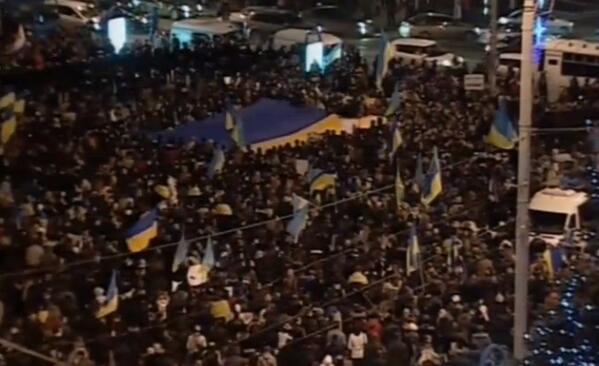
Photo: @PeterShuklinov
According to Ukrainskaya Pravda, there were around 5000 demonstrators faced by around 2000 pro-Russian activists. The paper reports pro-Russian protesters grabbing their victims one by one, spraying (what we assume to be tear) gas in their eyes, beating and spitting on them.
The pro-Russian demonstrators stormed the offices of the Regional Administration, recapturing it having been evicted earlier in the week. They were led by the self-proclaimed ‘People’s Governor’ of Kharkiv, Pavel Gubarev.
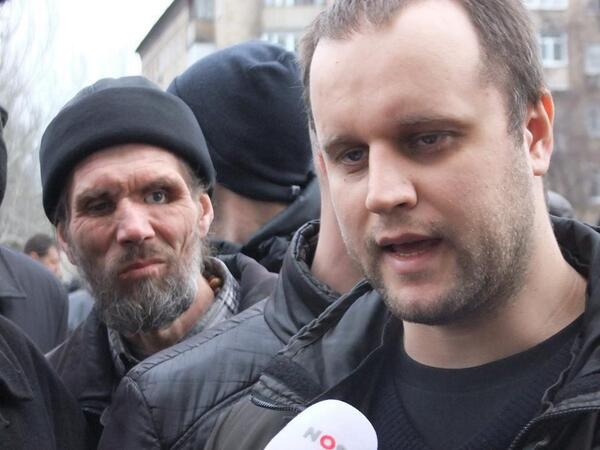
Pavel Gubarev (right)
The New York Times reports:
In an interview before the building’s recapture, Sergey V. Bogachev, the secretary of the City Council, which has called for a referendum to extend the city’s authority, condemned Mr. Gubarev’s actions as possibly criminal. However, the protests, Mr. Bogachev said, reflected public fear that the interim government would limit the rights of ethnic Russians, who are a majority of the population here.
In the darkened building, demonstrators sought to extend their control, fiddling with electrical boxes and trying to use a circular saw to cut their way into an access stairway. Organizers tried to control the protesters, telling them not to attack the police or journalists. The police did not appear to make any arrests and did not use nightsticks during the clash.
1823 GMT: Yesterday, a very talkative soldier in Kerch was interviewed by journalists. He admitted that he was a Russian soldier, but was told not to carry any identifying insignias or symbols. An English Translation has been provided on Facebook.
Key excerpt:
Male Journalist: You’re Ukrainians?
Soldier: Us ? We’re RussiansMale Journalist: In that case, as you are the leader of the unit, please explain what the armed forces of Russia are doing on the territory of Ukraine ?
S: We are carrying out protection duties
MJ: What kind ?
Female Journalist: What kind of protection ?
S: To prevent terrorist acts
MJ: There is information that there will be terrorist acts?? What kind?
S: I don’t know. I cannot reply to your questions.
1806 GMT: More on the story that a phone call has been leaked reportedly of a conversation between Estonian foreign minister, Urmas Paet, and the EU High Commissioner for Foreign Affairs, Catherine Ashton, where it was suggested that the opposition coalition may have been in command of snipers who shot civilians (jump to update 1740 for more).
Estonian FM Paet on the tapped call about snipers: “I was talking on the theories there were about what happened (on #euromaidan)”
— Jüri Maloverjan (@MaloverjanBBC) March 5, 2014
“…from both sides – among policemen and the people from the streets – that they were the same snipers killing people from both sides”
— Jüri Maloverjan (@MaloverjanBBC) March 5, 2014
The Estonian Foreign Ministry has released a statement, confirming the authenticity of the conversation but denying the claims made by RT.com that Foreign Minister Paet was stating as fact that the opposition was responsible for the snipers.
The Estonian foreign ministry confirmed the recording was genuine and the 11-minute conversation took place on 26 February.
“The recording of a telephone conversation between Foreign Minister Urmas Paet and High Representative Catherine Ashton that has been leaked online is authentic,” the ministry said.
“We reject the claim that Paet was giving an assessment of the opposition’s involvement in the violence. ”
“It is extremely regrettable that phone calls are being intercepted,” Paet added. “The fact that this phone call has been leaked is not a coincidence.”
A spokesperson for Ashton refused to comment.
RT @MaloverjanBBC Estonian FM Paet on the tapped call about snipers: “I was talking on the theories there were about what happened”
— Myroslava Petsa (@myroslavapetsa) March 5, 2014
1800 GMT: Samantha Power, the US ambassador to the UN, has commented on the story that UN envoy Robert Serry has been forced to leave the country by pro-Russian gunmen:
Why is it that an unarmed mediator representing the #UN Secretary-General is stopped and seriously threatened by armed forces?
— Samantha Power (@AmbassadorPower) March 5, 2014
As I said to #UNSC, only someone who fears the truth would be fearful of monitors with specific mission of identifying and reporting truth.
— Samantha Power (@AmbassadorPower) March 5, 2014
1750 GMT: A Ukrainian official has reportedly been kidnapped in Yalta, in Crimea. The Interpreter has translated the report from Pravda.com.ua:
In Crimea, unknowns have abducted the director of personnel for the Administration of the State Border Service, Mikhail Koval.
This information was confirmed to Ukrainskaya Pravda by Sergei Astakhov, assistant head at the State Border Service.
In his words, “there are concrete grounds for saying that he has been captured by unknown persons.”
“We’re making approaches to law enforcement agencies and making every effort to find him,” he said.
Earlier, Euromaidan SOS reported that Koval had been “kidnapped outside a military installation near Yalta.”
“According to an eyewitness, Russian bikers stopped M.V. Koval’s car, slashed its tires, and took off with the border official.”
Earlier on Wednesday, he attended a meeting with staff from the Border Service in Balaklava, at which a representative of the pro-Russian Crimean leadership tried to persuade border guards to go over to the Russian side.
Border officials have also reported pressure and threats against both them and their families.
1740 GMT: This morning, one of our lead stories was leaked audio, reportedly of a phone call between Estonian foreign minister, Urmas Paet, and the EU High Commissioner for Foreign Affairs, Catherine Ashton (jump to update 1430).
The Telegraph has spoken to the activist at the heart of this controversy. She denies that this is what she said:
Olga Bogomolets said she had not told Mr Paet that policemen and protesters had been killed in the same manner.
“Myself I saw only protesters. I do not know the type of wounds suffered by military people,” she told The Telegraph. “I have no access to those people.”
But she said she had asked for a full forensic criminal investigation into the deaths that occurred in the Maidan. “No one who just sees the wounds when treating the victims can make a determination about the type of weapons. I hope international experts and Ukrainian investigators will make a determination of what type of weapons, who was involved in the killings and how it was done. I have no data to prove anything.
“I was a doctor helping to save people on the square. There were 15 people killed on the first day by snipers. They were shot directly to the heart, brain and arteries. There were more than 40 the next day, 12 of them died in my arms.
So, assuming this is not fake, when Urmas Paet quotes Olga, is he misunderstanding what she told him? And when he says “there is a growing understanding” that the snipers were shooting people on both side, does he mean that there is growing evidence (we have not seen it) or does he mean that some people in the streets are suggesting this? If there is strong evidence, it has not been made public.
On a side note, on February 24th we published a report from Ares, or Armed Research Services, that suggested that the sniper rifles being used to kill civilians were specialized weapons that were only given to Ukrainian Interior Ministry Special Forces. And those forces were very much in President Yanukovych’s control.
1724 GMT: Again, the UN envoy in Simferopol is being forced to leave the country.
Crowd chant Russia Russia as UN envoy leaves coffee shop and scrambles into waiting car#Crimea
— James Mates (@jamesmatesitv) March 5, 2014
Path of envoy’s car blocked by protesters chanting Putin Putin. #Crimea
— James Mates (@jamesmatesitv) March 5, 2014
Car moves slowly off to cries of Crimea Russiia #Ukraine
— James Mates (@jamesmatesitv) March 5, 2014
Robert Serry finally on his way to the airport, police having forced a way through an angry crowd. #crimea
— James Mates (@jamesmatesitv) March 5, 2014
1712 GMT: The mood in Crimea has changed significantly in the last few hours. The UN envoy is being held at gunpoint (updates below), there was another kidnapping in Yalta (see update 1648), and now more news that’s unsettling:
Back in Simferopol ugly mood and bunches of men with brown-gold ribbons on street corners. Not surprised UN envoy Serry was intimidated
— Anshel Pfeffer (@AnshelPfeffer) March 5, 2014
We’re checking the claim below:
Report Ukrainian military at Belbek airbase being shut off from water and Russian troops not allowing food to be delivered. Seige warfare
— bruce springnote (@BSpringnote) March 5, 2014
And now these updates:
Robert Serry has now agreed to go straight to the airport and end his mission in #Crimea
— James Mates (@jamesmatesitv) March 5, 2014
UN special envoy Robert Serry with me in coffee shop. Outside local militia block the door. #Ukraine pic.twitter.com/pbotNqCG3i
— James Mates (@jamesmatesitv) March 5, 2014
1705 GMT: An ITV news crew is with the UN envoy who is being held in Simferopol:
Outside coffee shop are men in combat fatigues blocking the door. Some wear pro Russia black and gold arm band. Not allowing anyone in/out
— James Mates (@jamesmatesitv) March 5, 2014
Some details on how this started:
UN special advisor Robert Serry had been visiting navy commander when his car was blocked. Stand off followed #Ukraine
— James Mates (@jamesmatesitv) March 5, 2014
He refused to go with men blocking car, got out and walked until he found coffee shop. He’s asked ITV News team to stay with him. #Ukraine
— James Mates (@jamesmatesitv) March 5, 2014
UN special envoy Robert Serry’s assistant says she saw at least one man with a gun among group who blocked his car. #Ukraine
— James Mates (@jamesmatesitv) March 5, 2014
Special rep is waiting in coffee shop for help. He’s asked us to stay with him and keep filming #Ukriane
— James Mates (@jamesmatesitv) March 5, 2014
1656 GMT: It seems “kidnapped” is far too strong a word, but the UN envoy Robert Serry is being held against his will:
ITV News -> RT @jamesmatesitv: With Robert #Serry now. not kidnapped, but held in a coffee shop. Some men outside prevent him from leaving.
— Brian Ries (@moneyries) March 5, 2014
1653 GMT: Below is the Interfax report on the kidnapped UN envoy, translated by The Interpreter:
The Ukrainian MFA reported that the Special Envoy for the Secretary General of the UN, Robert Serry, who had arrived with the mission in the Crimea, has been seized by unidentified armed men.
R. Serri has just informed us that his car has been blocked in Simferopol by unidentified armed men in uniform who told him that they were going to take him to the airport. He refused to go and is now captured and held hostage by the unidentified men”, said the director of the information department at the Ukrainian Ministry of Foreign Affairs, Yevhen Perebiynis.
1648 GMT: Another kidnapping reported today:
Another reported kidnapping today: Colonel-General Mikhail Koval abducted near Yalta military base – @ukrpravda_news http://t.co/aYN5VazkBm
— Christopher Miller (@ChristopherJM) March 5, 2014
1645 GMT: More details, but note that it’s still the same source:
Report: UN secretary general’s special representative seized by armed men in #Crimea, says #Ukraine Foreign Ministry http://t.co/2joUz9TZSH
— Maks Czuperski (@MaksCzuperski) March 5, 2014
.@UN envoy Robert Serry kidnapped at gunpoint in #Simferopol, #Crimea today, reports @interfax_news, citing @MFA_Ukraine. #Ukraine
— Christopher Miller (@ChristopherJM) March 5, 2014
1618 GMT: Pictures have gone viral that show a Ukrainian soldier, trapped in an isolated base in Crimea by Russian soldiers, kissing his wife and talking to his daughter through the iron bars of the fences surrounding the base. Since February 28th and the days that have followed, Ukrainian forces have been locked inside their bases and will not be allowed to leave unless they surrender.
1605 GMT: Proof that Russian naval ships from the Black Sea fleet are directly interfering with Ukrainian naval operations. This video reportedly shows Russian tugs blocking a Ukrainian naval ship in Sevastopol bay:
The tug can easily be identified by its ID number on its hull, “МБ-174,” which, according to both Russian language and English naval websites, is a Russian tug from the Black Sea fleet:
This is not it’s “normal” position (see previous update below).
1508 GMT: Sergei Lavrov, Russia’s foreign minister, has reiterated the obvious falsehood that the troops that have taken over Crimea are not Russian:
Lavrov repeated Russia’s assertion that armed men deployed there are not Russian forces and said that Russia’s Black Sea naval personnel were in normal positions.
Lavrov vowed to prevent bloodshed in Ukraine, including attacks against its own citizens.
“We will not allow bloodshed. We will not allow attempts against the lives and well-being of those who live in Ukraine and Russian citizens who live in Ukraine,” Lavrov told the news conference.
A few things to keep in mind: First, the troops have admitted, on multiple occasions in multiple places to multiple reporters, that they are indeed Russian soldiers. Second, the Russian navy is also out of place, and some of the ships are clearly not from the Black Fleet but the Baltic Sea fleet, in violation of Russia’s agreements. This is incredibly easy to verify, as the ships are easily identifiable, have been visually recorded by both Ukrainian civilians and reporters, and can be geolocated as being out of “normal positions.”
But worst of all, the Russian government itself has admitted as such. On February 28th, Russian APCs with Russian flags on them were spotted near Belbek airbase, and the Russian foreign ministry admitted that the vehicles were on the move:
The Russian Foreign Ministry said movements of armored vehicles belonging to the Russian Black Sea Fleet were prompted by the need to ensure security of its base and didn’t contradict the lease terms.
So let’s cut the charade, shall we? No? Oh well.
Here’s some other news about these not-Russian-but-yeah-definitely-Russian-military paramilitary troops:
#Ukraine: OSCE observers blocked from entering #Crimea – Blocked by the Russian troops Putin claims aren’t there? http://t.co/gKrd1rV4Wf
— Andrew Stroehlein (@astroehlein) March 5, 2014
Cdr Cape Fiolent base says 2 #Russian capns offered him money and #Russian passport to defect and when he refused occupied the base. 1/2
— Lindsey Hilsum (@lindseyhilsum) March 5, 2014
#Lavrov says ‘self defence units’ occupying #Crimea bases so how come they offer #Russian passports and drive Russian military vehicle? 2/2
— Lindsey Hilsum (@lindseyhilsum) March 5, 2014
And sarcasm always makes one feel better about ridiculous news:
There are no foreign journalists in Ukraine, either. Just some people who happen to be dressed like them.
— Mark MacKinnon (@markmackinnon) March 5, 2014
1450 GMT: Call this the economic H-bomb: Russian lawmakers are drafting a law that will allow them to nationalize the assets of US or European companies if the US or EU pass sanctions against Russia.
This is a draft law, and it may or may not come to fruition, but the fact that it is being debated is chilling. For anyone downplaying the severity of this crisis or the breach between the West and Russia, even the whisper of such a law in the Duma should put things intro perspective.
And we know that this administration has a history of nationalizing the assets of oligarchs and businesses that cross its path, so the threat needs to be taken seriously, even if, for now, it’s just a threat.
1430 GMT: Russian state-run media have released an audio recording of a phone call on February 25 between the Estonian foreign minister, Urmas Paet, and the EU High Commissioner for Foreign Affairs, Catherine Ashton. In the taped call, Paet refers to statements from an activist, Olga, who suggests that the victims of gunfire on both sides, protesters and police, were struck with the same bullets. Paet says that “there is a growing understanding” that opposition politicians were behind the sniper attacks rather than the Yanukovych government.
The release of this tapped phone call follows two similar incidents last month, in which private phone calls between diplomats, both US and German, were published online. The moves bear all the hallmarks of FSB operations, despite RT‘s claim that:
The file was reportedly uploaded to the web by officers of Security Service of Ukraine (SBU) loyal to ousted President Viktor Yanukovich who hacked Paet’s and Ashton’s phones.
1428 GMT: The Chief Rabbi of Ukraine, Yaakov Dov Bleich has said, during a press conference in New York, that Ukrainian Jews are in greater danger from “real Russian provocations” than “made-up Ukrainian nationalists”. Kharkiv-based outlet ATN reports his statements:
“We expect that there will be provocations. We’re anticipating that the Russians will want to justify their invasion of Ukraine. They’re now saying in the media that Banderists are attacking synagogues, but no such thing is happening. There could be provocations – some-one could dress up as a Ukrainian nationalist and start beating Jews. I’m not afraid of this comparison with what the Nazis did during the Anschluss.”
According to the Rabbi, despite statements in the Russian media, practically no anti-Semitic attacks have been observed in Ukraine. He recalled that it was only after Russian troops had occupied the Crimea, that the first act of anti-Semitic vandalism occurred there.
